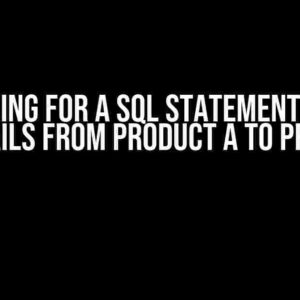If you’re an Azure SQL developer, you’ve likely stumbled upon a frustrating phenomenon: a query that returns different results when using a variable versus hardcoded values. This article will delve into the reasons behind this behavior and provide practical solutions to overcome it.
What’s Behind the Difference?
The root cause of this issue lies in how Azure SQL handles query optimization and parameter sniffing. When you use a variable in your query, Azure SQL creates an execution plan based on the data type of the variable, rather than the actual value. This can lead to suboptimal performance and varying results.
Parameter Sniffing
Parameter sniffing is a process where Azure SQL optimizes a query plan based on the initial value of a parameter. If the parameter value changes, the optimization plan may not be recompiled, leading to inefficient execution and differing results.
Data Type Differences
Another crucial factor is the data type of the variable versus the hardcoded value. Azure SQL may interpret the data type differently, affecting the query’s behavior and output.
Reproducing the Issue
Let’s create a simple example to demonstrate the problem. Suppose we have a table dbo.Employees with a column Salary of type decimal(10, 2).
CREATE TABLE dbo.Employees (
EmployeeID int,
Salary decimal(10, 2)
);
INSERT INTO dbo.Employees (EmployeeID, Salary)
VALUES (1, 50000.00),
(2, 60000.00),
(3, 70000.00);
Now, let’s execute two queries: one with a variable and one with a hardcoded value.
DECLARE @Salary decimal(10, 2) = 60000.00; SELECT * FROM dbo.Employees WHERE Salary = @Salary; SELECT * FROM dbo.Employees WHERE Salary = 60000.00;
You might expect both queries to return the same result: a single row with EmployeeID 2. However, the query with the variable may return multiple rows or even an empty set, depending on the execution plan and parameter sniffing.
Solutions to Overcome the Issue
Don’t worry; we’ve got you covered! Here are some practical solutions to ensure consistent results in Azure SQL:
Use the OPTION (RECOMPILE) Hint
Add the OPTION (RECOMPILE) hint to the end of your query to force Azure SQL to recompile the execution plan each time it’s executed.
DECLARE @Salary decimal(10, 2) = 60000.00; SELECT * FROM dbo.Employees WHERE Salary = @Salary OPTION (RECOMPILE);
Use the OPTIMIZE FOR UNKNOWN Hint
Alternatively, you can use the OPTIMIZE FOR UNKNOWN hint to instruct Azure SQL to optimize the query plan for an unknown value, rather than the initial parameter value.
DECLARE @Salary decimal(10, 2) = 60000.00; SELECT * FROM dbo.Employees WHERE Salary = @Salary OPTION (OPTIMIZE FOR UNKNOWN);
Cast the Variable to the Correct Data Type
Ensure that the data type of the variable matches the column data type exactly. In our example, we can cast the variable to decimal(10, 2) to avoid potential data type differences.
DECLARE @Salary decimal(10, 2) = CAST(60000.00 AS decimal(10, 2)); SELECT * FROM dbo.Employees WHERE Salary = @Salary;
Use a Parameterized Query
A parameterized query can help avoid parameter sniffing issues. You can create a stored procedure or use the sp_executesql system stored procedure to execute a parameterized query.
CREATE PROCEDURE dbo.GetEmployeesBySalary
@Salary decimal(10, 2)
AS
BEGIN
EXEC sp_executesql N'SELECT * FROM dbo.Employees WHERE Salary = @Salary', N'@Salary decimal(10, 2)', @Salary;
END;
GO
EXEC dbo.GetEmployeesBySalary @Salary = 60000.00;
Best Practices to Avoid the Issue
To avoid the Azure SQL variable vs. hardcoded value issue, follow these best practices:
- Use the same data type for variables and column definitions.
- Avoid using variables with ambiguous data types (e.g.,
varcharinstead ofvarchar(50)). - Use parameterized queries or stored procedures to reduce parameter sniffing.
- Test your queries with different parameter values to ensure consistent results.
- Monitor query performance and execution plans to identify potential issues.
Conclusion
Azure SQL’s variable vs. hardcoded value issue can be frustrating, but understanding the underlying causes and applying the solutions and best practices outlined in this article will help you overcome it. By taking control of query optimization and parameter sniffing, you’ll ensure consistent and accurate results in your Azure SQL queries.
| Solution | Description |
|---|---|
OPTION (RECOMPILE) Hint |
Forces Azure SQL to recompile the execution plan each time the query is executed. |
OPTIMIZE FOR UNKNOWN Hint |
Optimizes the query plan for an unknown value, rather than the initial parameter value. |
| Casting the Variable to the Correct Data Type | Ensures that the data type of the variable matches the column data type exactly. |
| Parameterized Query | Helps avoid parameter sniffing issues by using a stored procedure or the sp_executesql system stored procedure. |
By following these guidelines, you’ll be well-equipped to tackle the Azure SQL variable vs. hardcoded value issue and ensure consistent, accurate results in your queries.
Keywords: Azure SQL, variable vs. hardcoded value, query optimization, parameter sniffing, execution plan, data type, parameterized query, stored procedure, OPTION (RECOMPILE), OPTIMIZE FOR UNKNOWN, sp_executesql.
Word Count: 1066
Frequently Asked Question
Get ready to dive into the world of Azure SQL and uncover the mysteries behind different output results!
Why does Azure SQL return different results for a query with variables versus a query with hardcoded values?
This is due to the way Azure SQL handles query optimization and caching. When you use variables, the query optimizer doesn’t know the actual values until runtime, so it creates a more general plan that can be reused for different input values. On the other hand, when you hardcode values, the optimizer can create a more specific plan that’s optimized for those exact values. This can lead to different execution plans and, consequently, different results.
Does this mean I should always use hardcoded values in my Azure SQL queries?
Not necessarily! While hardcoded values can provide better performance in some cases, they can also make your code less flexible and more prone to errors. Variables are still a good choice when you need to reuse the same query with different input values. To get the best of both worlds, you can use techniques like parameter sniffing or option(recompile) to help the optimizer create a more efficient plan.
What’s parameter sniffing, and how can it help with query optimization?
Parameter sniffing is a technique where the query optimizer uses the actual parameter values to create a more accurate execution plan. By sniffing the parameter values, the optimizer can create a plan that’s tailored to the specific input data, reducing the chance of suboptimal plans. You can enable parameter sniffing by using the OPTIMIZE FOR or OPTIMIZE FOR UNKNOWN hints in your queries.
How can I troubleshoot issues related to different output results in Azure SQL?
To troubleshoot these issues, start by analyzing the execution plans for both the variable-based and hardcoded queries. You can use tools like the Azure Data Studio or SQL Server Management Studio to visualize the plans and identify any differences. Additionally, check the query stats, like the number of rows returned and the execution time, to see if there are any discrepancies. Finally, review your database configuration and indexing strategy to ensure they’re optimized for your workload.
Are there any best practices for writing queries that use variables in Azure SQL?
Yes! When writing queries with variables, make sure to declare the variables with the correct data type and size to avoid implicit conversions. Also, try to use meaningful variable names to improve code readability. Finally, consider using table variables or temporary tables instead of scalar variables to improve performance and reduce memory usage. By following these best practices, you can write more efficient and effective queries that get the most out of Azure SQL!



